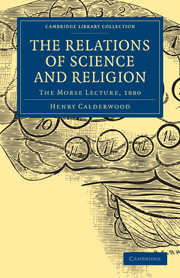Book contents
- Frontmatter
- EXTRACT FROM THE DEED OF TRUST, ESTABLISHING THE MORSE LECTURESHIP
- PREFACE
- Contents
- LECTURE I CONDITIONS OF THE INQUIRY
- LECTURE II EXPERIENCE GATHERED FROM PAST CONFLICTS
- LECTURE III INORGANIC ELEMENTS IN THE UNIVERSE
- LECTURE IV ORGANIZED EXISTENCE. LIFE AND ITS DEVELOPMENT
- LECTURE V RELATIONS OF LOWER AND HIGHER ORGANISMS
- LECTURE VI HIGHER ORGANISMS;—RESEMBLANCES AND CONTRASTS
- LECTURE VII MAN'S PLACE IN THE WORLD
- LECTURE VIII DIVINE INTERPOSITION FOR MORAL GOVERNMENT
- APPENDIX
LECTURE I - CONDITIONS OF THE INQUIRY
Published online by Cambridge University Press: 05 October 2010
- Frontmatter
- EXTRACT FROM THE DEED OF TRUST, ESTABLISHING THE MORSE LECTURESHIP
- PREFACE
- Contents
- LECTURE I CONDITIONS OF THE INQUIRY
- LECTURE II EXPERIENCE GATHERED FROM PAST CONFLICTS
- LECTURE III INORGANIC ELEMENTS IN THE UNIVERSE
- LECTURE IV ORGANIZED EXISTENCE. LIFE AND ITS DEVELOPMENT
- LECTURE V RELATIONS OF LOWER AND HIGHER ORGANISMS
- LECTURE VI HIGHER ORGANISMS;—RESEMBLANCES AND CONTRASTS
- LECTURE VII MAN'S PLACE IN THE WORLD
- LECTURE VIII DIVINE INTERPOSITION FOR MORAL GOVERNMENT
- APPENDIX
Summary
AMONG the many advantages enjoyed by the present generation, one of the most conspicuous is that arising from the large advance made in physical science. The high value of this is apparent from whatever standpoint it is regarded. The vastly wider range of knowledge, the increase of appliances for inquiry, the greater facilities for work of all kinds, the freer intercommunion of all the divisions of our race, and the greater altitude from which the whole realm of existence can be contemplated; all these involve an immense gain for the present century.
With these advantages, however, there comes the difficulty of using them aright, a difficulty which we may expect to be greater when we are dealing with wider and more general aspects of existence, than when we are concerned with more restricted ranges of knowledge. It may be a much easier thing to state precisely how recent advances have affected a particular branch of science, such as astronomy or geology, than to say how they bear upon the general conception of the universe. Yet, while the latter is the more difficult question, it is that with which men generally must be more concerned. Only a very limited number of men can belong to the ranks of specialists devoted to a single branch of science. All men, specialists as well as others, are concerned with the wider question as to the true conception of the universe, and the bearing it has on human life and destiny.
- Type
- Chapter
- Information
- The Relations of Science and ReligionThe Morse Lecture, 1880, pp. 9 - 42Publisher: Cambridge University PressPrint publication year: 2009First published in: 1881



